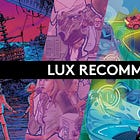The birth of man, hunting rats, rivers and global warming. Plus, Dan Wang on Breakneck.
From Lux Capital
Enveda, a Lux portfolio company, has just achieved unicorn status, according to Bloomberg. The biotech company seeks to use AI to speed the pathway from nature to the pharmacy for new drugs.
Also in healthtech news, Fierce Pharma has selected Lux’s Deena Shakir as one of its Fierce 50 of 2025. “We’re not just talking about words and intellectual topics,” she said of the drive to invest in women’s health technology, “we’re talking about real lives here.” You can catch her and other Lux healthtech founders at the Deus Ex Medicina summit on September 9.
Lux’s Brandon Reeves recently spoke to Venture Capital Journal about Lux’s investments in the defense tech sector, including Anduril and Hadrian. “Prime contractors,” the journal noted, “fund the defense systems they build with government program dollars rather than off their own balance sheets.” Therefore, Reeves said, “They take almost no risk, and without any risk, there’s no innovation. … Anduril is taking the risk with an enormous R&D spend that is purposeful and strategic.”
Finally, Ramp, the fintech startup building automated financial stacks, hit $1 billion in annualized revenue as of late August, according to Fortune magazine.
From around the web
1. Genesis.js
If you were around for the creation of man, our current AI moment might seem eerily familiar. This week, Laurence directs you to Astral Codex Ten’s imagining of a debate between God, Iblis and Dwarkesh Patel about the Almighty’s latest innovation: biological intelligence. (Up next, BGI.)
Iblis: Pfah! Lines on graphs! What you don’t realize is that all exponentials eventually become sigmoids. And your biological intelligences are doing harm now. Did you know that each BI needs eight glasses of water per day? And what about the sycophancy? I mean, look at this!
God: That was the 4o model. It’s been superseded, but we kept it as an option because some users liked it.
2. Rock solid
Biological intelligence may not be perfect, but at least we humans have a pretty good grasp on the world around us, right? Not really. New evidence suggests that our basic understanding of rocks — and how they form — could need rethinking. H/t our scientist in residence Sam Arbesman.
Reporting in the journal Geology, the scientists say the new rocks are evidence for a rapid anthropoclastic rock cycle - where human activity is altering the landscape. Such rocks are likely to be commonplace in industrial areas all over the world (Britain alone has 120km of coastal slag deposits) and are likely to be having an impact on marine ecosystems and coastal erosion. The researchers are now using drones and ground-penetrating radar to better understand the rock-making process and its effect on the environment.
3. Current events
Also in need of an update is our understanding of non-costal floods. After this summer’s devastation along the Guadalupe River in Texas, it is clear that riverine flooding can be far more dangerous than ocean swells — and far more unexpected. John Seabrook’s reporting in The New Yorker is well worth a read.
Before Geiger joined Two Rivers, he was briefly a firefighter in Zion National Park, in Utah, and he brings an emergency worker’s mind-set to flooding. “The fire department thinks your house is going to burn down, right?” he said. “The reason the fire department exists is they believe that things are going to burn.” But there is no equivalent of a fire department in flood response. That’s because, Geiger continued, “we don’t believe in floods the same way. We don’t practice for them.” He glanced over at the Ottauquechee. “Maybe it’s because fires don’t have a benign state like rivers do. Today the river is happy.”
For more on the risks of flooding, you should also check out “The taps are dry and the rivers are flooded” from earlier this summer.
4. Swamp things
What goes with the birth of man, the formation of rock, and Biblical flooding? Pestilence, of course. I very much enjoyed Nathaniel Rich’s visit to the Louisiana swamp-rat rodeo, written up in Harpers. Most years, competitors descend on the marina in Venice to see who can kill as many of the 10–20 pound invasive species in 24 hours. It’s part of the state’s program to cull the invasive species, which are voracious eaters and are devastating the flora of Louisiana’s Mississippi River delta. This one is worth a quote and a photo.
Last year, the largest payout at the rodeo was claimed by Ratatouille Slaughterhouse, a hulking posse of hunting buddies from greater Baton Rouge, which swept the (non-airboat division) categories of Biggest Rat (19.8 pounds), Three Rat Aggregate (53.9), and Most Rats (243, more than triple the Bayou Bounty Busters’ 79). In their spare time, the Slaughterhouse men landscape, install gutters and patio covers, and engineer pipelines. But mainly they hunt. “If I ain’t making money,” said Jason Gibson, who purchased and designed a new dual-rig mud boat for this year’s rodeo, “I’m killing something.”
5. Auction impossible
Finally, a palate cleanser: Over in The New Yorker, Sam Knight has a fascinating deep-dive on Patrick Drahi, the telecoms billionaire who bought and then tried to reinvent Sotheby’s. As it turns out, for an outsider more versed in cable deals than canvases, it might be impossible to manage a storied art institution like a business — especially through a pandemic, inflation, and the vagaries of Trumponomics.
It was the Romans, auctioneers of their own empire, who came up with job titles for the people involved: dominus, the seller; argentarius, the organizer; emptor, the buyer. Caveat emptor—buyer beware. No one knows how much Drahi understood about what he was buying in 2019. “I could truly think that he bought Sotheby’s thinking, This is run the old-fashioned way by a bunch of morons who know about art but don’t know about finance,” the French adviser said. “I think he felt that Sotheby’s was completely virgin of all that. And it’s not true.”
From Riskgaming
Earlier this week, we had Dan Wang on the podcast to talk about his new book, Breakneck. We talked about authoritarianism, degrowth, and the lessons the United States should learn from China. From Dan:
I think we are absolutely learning the wrong lessons from China… What we are learning from China is a loss of data probity. What we are learning from China is visiting misfortune upon a lot of the downtrodden, surrounding the top leader with acolytes and producing the sense that every mistake is the fault of foreigners or traitors. And I think what we have in the United States is, unfortunately, authoritarianism without the good stuff.






